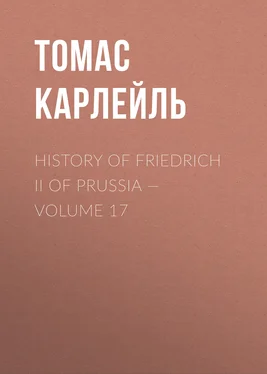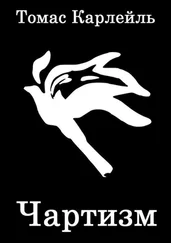Томас Карлейль - History of Friedrich II of Prussia — Volume 17
Здесь есть возможность читать онлайн «Томас Карлейль - History of Friedrich II of Prussia — Volume 17» — ознакомительный отрывок электронной книги совершенно бесплатно, а после прочтения отрывка купить полную версию. В некоторых случаях можно слушать аудио, скачать через торрент в формате fb2 и присутствует краткое содержание. Жанр: foreign_prose, История, literature_19, foreign_edu, foreign_antique, на английском языке. Описание произведения, (предисловие) а так же отзывы посетителей доступны на портале библиотеки ЛибКат.
- Название:History of Friedrich II of Prussia — Volume 17
- Автор:
- Жанр:
- Год:неизвестен
- ISBN:нет данных
- Рейтинг книги:4 / 5. Голосов: 1
-
Избранное:Добавить в избранное
- Отзывы:
-
Ваша оценка:
- 80
- 1
- 2
- 3
- 4
- 5
History of Friedrich II of Prussia — Volume 17: краткое содержание, описание и аннотация
Предлагаем к чтению аннотацию, описание, краткое содержание или предисловие (зависит от того, что написал сам автор книги «History of Friedrich II of Prussia — Volume 17»). Если вы не нашли необходимую информацию о книге — напишите в комментариях, мы постараемся отыскать её.
History of Friedrich II of Prussia — Volume 17 — читать онлайн ознакомительный отрывок
Ниже представлен текст книги, разбитый по страницам. Система сохранения места последней прочитанной страницы, позволяет с удобством читать онлайн бесплатно книгу «History of Friedrich II of Prussia — Volume 17», без необходимости каждый раз заново искать на чём Вы остановились. Поставьте закладку, и сможете в любой момент перейти на страницу, на которой закончили чтение.
Интервал:
Закладка:
Britannic Majesty, on applying at Vienna (through Keith, Sir or Mr. Robert Keith, the FIRST Excellency of that name, for there are two, a father and a son, both Vienna Excellencies), was astonished to learn That, in such event of an Aggression, even on Hanover, there was no co-operation to be looked for here. Altogether cold on that subject, her Imperial Majesty seems; regardless of Excellency Keith's remonstrances and urgencies; and, in the end, is flatly negatory: "Cannot do it, your Excellency; times so perilous, bad King of Prussia so minatory,"—not to mention, SOTTO VOCE that we have turned on our axis, and the wind (thanks to Kaunitz) no longer hits us on the same cheek as formerly!
"Cannot? Will not?" Britannic Majesty may well stare, wide-eyed; remembering such gigantic Subsidizings and Alcides Labors, Dettingens, Fontenoys, on the per-contra side. But so stands the fact: "No help from an ungrateful Vienna;—quick, then, seek elsewhere!" And Hanbury and the Continental British Excellencies have to bestir themselves as they never did. Especially Hanbury; who is directed upon Russia,—whom alone of these Excellencies it is worth while to follow for a moment. Russia, on fair subsidy, yielded us a 35,000 last War (willingly granted, most useful, though we had no fighting out of them, mere terror of them being enough): beyond all things, let Hanbury do his best in Russia!
Hanbury, cheerfully confident, provides himself with the requisites, store of bribe-money as the chief;—at Warsaw withal, he picks up one Poniatowski (airy sentimental coxcomb, rather of dissolute habits, handsomest and windiest of young Polacks): "Good for a Lover to the Grand-Duchess, this one!" thinks Hanbury. Which proved true, and had its uses for Hanbury;—Grand-Duchess and Grand-Duke (Catherine and Peter, whom we saw wedded twelve years ago, Heirs-Apparent of this Russian Chaos) being an abstrusely situated pair of Spouses; well capable of something political, in private ways, in such a scene of affairs; and Catherine, who is an extremely clever creature, being out of a lover just now. A fine scene for the Diplomatist, this Russia at present. Nowhere in the world can you do so much with bribery; quite a standing item, and financial necessary-of-life to Officials of the highest rank there, as Hanbury well knows. [His Letters (in Raumer), PASSIM.] That of Poniatowski proved, otherwise too, a notable stroke of Hanbury's; and shot the poor Polish Coxcomb aloft into tragic altitudes, on the sudden, as we all know!
Hanbury's immense dexterities, and incessant labors at Petersburg, shall lie hidden in the slop-pails: it is enough to say, his guineas, his dexterities and auxiliary Poniatowskis did prevail; and he triumphantly signed his Treaty (Petersburg, 30th September) "Subsidy-Treaty for 55,000 men, 15,000 of them cavalry," not to speak of "40 to 50 galleys" and the like; "to attack whomsoever Britannic Majesty bids: annual cost a mere 500,000 pounds while on service; 100,000 pounds while waiting." [In Adelung, vii. 609.] And, what is more, and what our readers are to mark, the 55,000 begin on the instant to assemble,—along the Livonian Frontier or Lithuanian, looking direct into Preussen. Diligently rendezvousing there; 55,000 of them, nay gradually 70,000; no stinginess in the Czarina to her Ally of England. A most triumphant thing, thinks Hanbury: Could another of you have done it? Signed, ready for ratifying, 30th September, 1755 (bad Braddock news not hindering);—and before it is ratified (this also let readers mark), the actual Troops getting on march.
Hanbury's masterpiece, surely; a glorious triumph in the circumstances, and a difficult, thinks Hanbury. Had Hanbury seen the inside of the cards, as readers have, he would not have thought it so triumphant. For years past,—especially since that "Fundamental maxim, May 14th-15th, 1753," which we heard of,—the Czarina's longings had been fixed. And here now—scattering money from both hands of it, and wooing us with diplomatic finessings—is the Fulfilment come! "Opportunity" upon Preussen; behold it here.
The Russian Senate again holds deliberation; declares (on the heel of this Hanbury Treaty), "in October, 1755," what we read above, That its Anti-Prussian intentions are—truculent indeed. And it is the common talk in Petersburg society, through Winter, what a dose the ambitious King of Prussia has got brewed for him, [MEMOIRE RAISONNE (in Gesammelte Nachrichten ), i. 429, &c.] out of Russian indignation and resources, miraculously set afloat by English guineas. A triumphant Hanbury, for the time being,—though a tragical enough by and by!
THE TRIUMPHANT HANBURY TREATY BECOMES, ITSELF, NOTHING OR LESS;—BUT PRODUCES A FRIEDRICH TREATY, FOLLOWED BY RESULTS WHICH SURPRISE EVERYBODY
King Friedrich's outlooks, on this consummation, may well seem to him critical. The sore longing of an infuriated Czarina is now let loose, and in a condition to fulfil itself! To Friedrich these Petersburg news are no secret; nor to him are the Petersburg private intentions a thing that can be doubted. Apart from the Menzel-Weingarten revelations, as we noticed once, it appears the Grand-Duke Peter (a great admirer of Friedrich, poor confused soul) had himself thrice-secretly warned Friedrich, That the mysterious Combination, Russia in the van, would attack him next Spring;—"not Weingarten that betrayed our GRAND MYSTERE; from first hand, that was done!" said Excellency Peubla, on quitting Berlin not long after. [Cogniazzo, Gestandnisse eines OEsterreichischen Veterans (as cited above), i. 225. "September 16th, 1756," Peubla left Berlin (Rodenbeck, i. 298),—three months after Weingarten's disappearance.] The Grand Mystery is not uncertain to Friedrich; and it may well be very formidable,—coupled with those Braddock explosions, Seizures of French ships, and English-French War imminent, and likely to become a general European one; which are the closing prospects of 1755. The French King he reckons not to be well disposed to him; their old Treaty of "twelve years" (since 1744) is just about running out. Not friendly, the French King, owing to little rubs that have been; still less the Pompadour;—though who could guess how implacable she was at "not being known (NE LA CONNAIS PAS)"! At Vienna, he is well aware, the humor towards him is mere cannibalism in refined forms. But most perilous of all, most immediately perilous, is the implacable Czarina, set afloat upon English guineas!
With a hope, as is credibly surmised, that the English might soothe or muzzle this implacable Czarina, Friedrich, directly after Hanbury's feat in Petersburg, applied at London, with an Offer which was very tempting there: "Suppose your Britannic Majesty would make, with me, an express 'NEUTRALITY CONVENTION;' mutual Covenant to keep the German Reich entirely free of this War now threatening to break out? To attack jointly, and sweep home again with vigor, any and every Armed Non-German setting foot on the German soil!" An offer most welcome to the Heads of Opposition, the Pitts and others of that Country; who wish dear Hanover safe enough (safe in Davy-Jones's locker, if that would do); but are tired of subsidizing, and fighting and tumulting, all the world over, for that high end. So that Friedrich's Proposal is grasped at; and after a little manipulation, the thing is actually concluded.
By no means much manipulation, both parties being willing. There was uncommonly rapid surgery of any little difficulties and discrepancies; rapid closure, instant salutary stitching together of that long unhealable Privateer Controversy, as the main item: "20,000 pounds allowed to Prussia for Prussian damages; and to England, from the other side, the remainder of Silesiau Debt, painfully outstanding for two or three years back, is to be paid off at once;"—and in this way such "NEUTRALITY CONVENTION OF PRUSSIA WITH ENGLAND" comes forth as a Practical Fact upon mankind. Done at Westminster, 16th January, 1756. The stepping-stone, as it proved, to a closer Treaty of the same date next Year; of which we shall hear a great deal. The stepping-stone, in fact, to many large things;—and to the ruin of our late "Russian-Subsidy Treaty" (Hanbury's masterpiece), for one small thing. "That is a Treaty signed, sure enough," answer they of St. James's; "and we will be handsome about it to her Czarish Majesty; but as to RATIFYING it, in its present form,—of course, never!"
Читать дальшеИнтервал:
Закладка:
Похожие книги на «History of Friedrich II of Prussia — Volume 17»
Представляем Вашему вниманию похожие книги на «History of Friedrich II of Prussia — Volume 17» списком для выбора. Мы отобрали схожую по названию и смыслу литературу в надежде предоставить читателям больше вариантов отыскать новые, интересные, ещё непрочитанные произведения.
Обсуждение, отзывы о книге «History of Friedrich II of Prussia — Volume 17» и просто собственные мнения читателей. Оставьте ваши комментарии, напишите, что Вы думаете о произведении, его смысле или главных героях. Укажите что конкретно понравилось, а что нет, и почему Вы так считаете.









